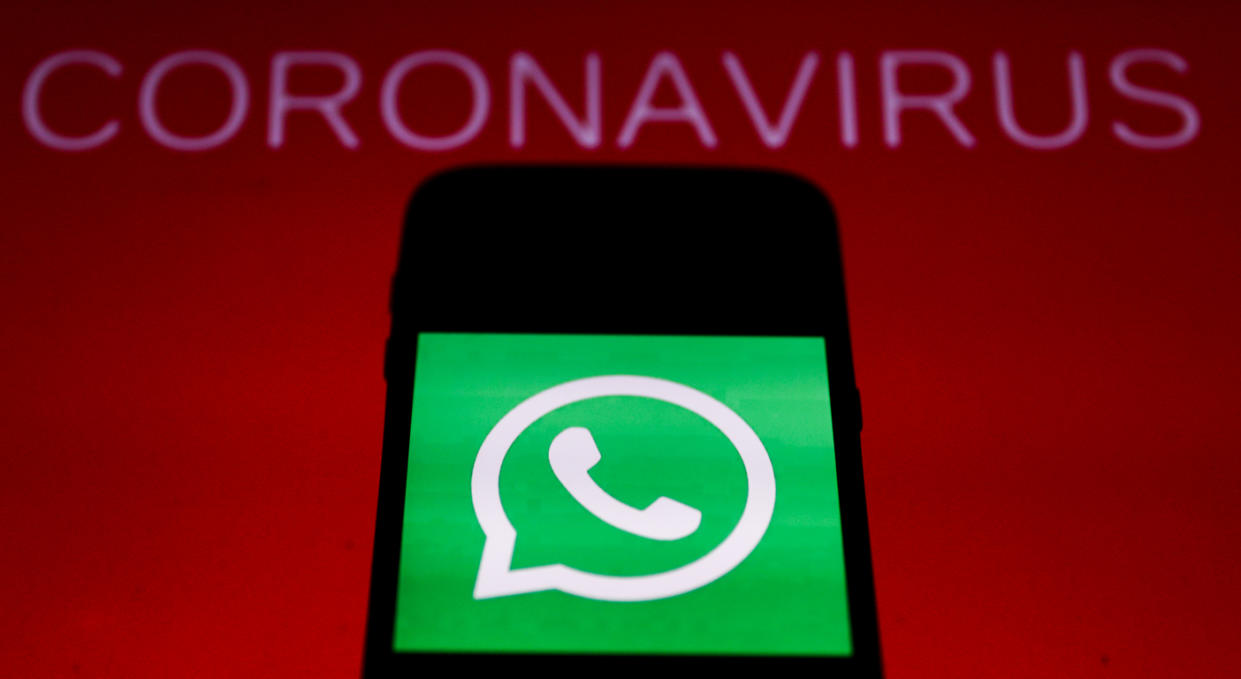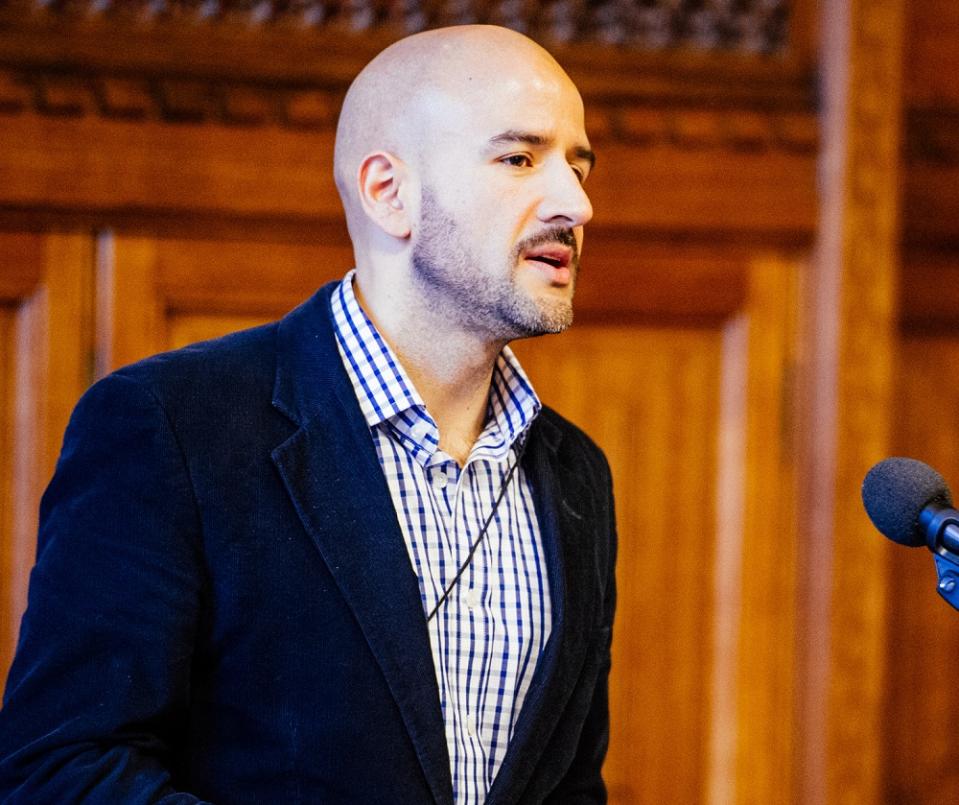'It's a huge problem:' Whatsapp takes action after spread of dangerous coronavirus lies

Instant messaging application WhatsApp is cracking down on COVID-19 misinformation on the app as a result of videos, photos and texts being forwarded by users about the cures for of the coronavirus.
The parent company of WhatsApp, Facebook announced the move saying they’ve limited the ability to forward a message which has already been forwarded on the application to only one user.
Gurgling warm water, eating fennel flower seeds or steaming your nose will not protect you from COVID-19, no matter what the scholars of WhatsApp University tell you.
After widespread WhatsApp disinformation was shared in India by Hindu extremists, leading to a pair of deadly attacks against Muslims in November 2018, Facebook eliminated mass-forwarding and quick-forward messages of media in South Asia.
At that time of the killings, WhatsApp users could forward messages to up to 250 people, which resulted in quick-fire misinformation spreading, and rumours which couldn’t be controlled.
For the past three weeks, South Asian parents like mine have told me of suspicious messages they’ve received regarding the ongoing pandemic.
For most Canadians, WhatsApp is a rather innocuous instant messaging application, which provides the user with more security than regular text messaging. But it has also become the home to some of the most damaging disinformation and rumours regarding COVID-19.
“Right when this crisis hit, I immediately thought, oh my god, this [app] is going to be rife with misinformation especially for South Asians,” said Sunny Hundal, a British journalist and founder of Barfi Culture.
First the conspiracy theories popped up regarding how China had created the virus in a lab, then it jumped to how governments were trying to control people, and now we’re at the stage where videos of cures are being shared by thousands of users.

Facebook, which has been besieged by governments around the world for not doing enough to combat disinformation around major events like elections.
It's not the first time WhatsApp disinformation entered Canadian life. During the 2019 federal election, it was used to target South Asians living in Canada, according to Hundal.
“I’ve seen it happen with elections in India and elections in Canada and the U.K. by the Indian government,” he said.
Almost two million people in Canada have cultural ties to Pakistan and India where there are 200 million WhatsApp users, the largest of any region.
As a result of its popularity, it’s become the best way for South Asians in the diaspora to connect with those in their homelands. With the quick learned knowledge of how to beat the virus, they’ve since been facetiously dubbed as scholars and graduates of WhatsApp University.
My mom and all her friends graduating from WhatsApp University with a Ph.D. in coronavirus science pic.twitter.com/FXiwlrhReg
— Saurabh Chowdhry (@SaurabhCh7) March 23, 2020
In Canada the messages are spreading like wildfire unbeknownst to most of the population, whereas South Asians are receiving debunked methods of how to beat COVID-19.
Jaskaran Singh Sandhu, a senior consultant with Crestview Strategy, says the major problem is that everyone who is messaging on the app already has a modicum of trust with the user.
“With WhatsApp you’re contacting people who are almost exclusively in your phone book, they’re people you trust... they’re friends, colleagues and extended family and onwards, you’ve got everyone there,” said Sandhu.
According to Hundal, the fallacy some less advanced users fall into is the idea that everything on the internet must be true.
“People trust too easily what comes into their phone from a friend, and they shouldn’t do that, they should do a quick google search and establish facts with a reputable news organization,” he said.
Anecdotally speaking, Sandhu feels most of the forwarded messages tend to come from the older generation, usually people who fall into either the Gen X or Baby Boomer demographic.
“The poorly put together videos, bad writing, sloppy photoshop may be a dead giveaway for someone who has spent their entire life on the internet, but for casual users they may not be able to discern what they’re looking at,” he said.
Why Whatsapp could be ‘particularly dangerous’
Social media apps like Twitter and Facebook have far more users, but they don’t offer the inherent personal relationships WhatsApp does.
“I think WhatsApp is particularly dangerous when it comes to misinformation because it’s coming from people you know,” said Hundal.
But unlike Facebook the disinformation, which sometimes is filled with hate, has been taken to another level resulting in dozens of deaths.
“Misinformation on WhatsApp in India has gotten people killed, it’s a big problem. We have families with lots of links there, who are used to this, and through this app it easily comes here,” said Hundal.
Last year data journalists at IndiaSpend, a public journalism initiative, estimated more than 30 people had been killed since 2017 as a result of rumours started and forwarded through WhatsApp.

Hundal fears the videos of people believing they can make their own sanitizer at home, or that the virus will be killed within 14 hours of being in the heat could result in people getting seriously hurt.
“The outright lies and bad information, if you don’t know what you’re looking at and you trust it, it could be bad. People need to trust the experts with [information about] the pandemic,” he said.
What can be done?
At the start of 2019, India began considering the idea of regulating WhatsApp, which included holding those who spread disinformation to account. But Facebook said that would effectively kill the end-to-end encryption the app specializes in.
“WhatsApp is a closed universe, it’s not like Facebook which is open... it’s hard to police that, a lot of people would be uncomfortable with that idea,” said Sandhu. “People would not use the app.”
Hundal agrees with Sandhu, but is of the belief that Facebook is content dominating the market and isn’t doing as much as they should to curb disinformation.
“Facebook bears huge responsibility to figure out how to stop misinformation on all their platforms -- they simply don’t do enough,” he said.
The company has teamed up with the World Health Organization (WHO) to allow users to receive a daily health update with the latest COVID-19 cases and tips.
The company has also donated $1 million to the International Fact-Checking Networking so organizations could increase their footprint on the app and have users send them rumours.
“This is an evolving crisis, so as world health officials issue new guidance and warnings about COVID-19, we’ll continue working with them to ensure people have access to accurate and authoritative information across all of our apps,” wrote Nick Clegg, VP of Global Affairs and Communications for Facebook in a press release,
The company announced a plan to invest $100-million into journalism initiatives to ensure people are continuing to gain access from reputable sources.
Before WhatsApp, Hundal said email forwarding used to be the big scam, which leads him to believe South Asians’ lack of media literacy coupled with their urge to gossip could make WhatsApp volatile in times like this.
“The gossip culture we’ve all grown up with in our culture is a big part of this, but it’s also a problem of media literacy,” said Hundal. “People don’t know what they’re looking at is fake.”

Media literacy is two-fold in Canada according to Hundal, who believes users may have distrust in media as a result of past experiences back home, and that Canadian outlets have not done enough to earn their trust.
“Media organizations have taken that trust for granted, and many of them don’t really reach out to South Asian communities, so they have less trust with that community,” he said.
Hundal is hoping the Canadian government and media organizations start to cater more towards the South Asian diaspora with information about COVID-19.
“You have to speak to people in a way that makes them trust you, tell them you’re there to look out for their interests, and build that trust,” he said.
But even if the media does their job, Sandhu hopes that people genuinely start to question the accuracy of what they’re being sent.
“There’s an element of self-responsibility that we have to be critical of the media we consume or the information that we’re getting regardless of whom it’s from,” said Sandhu.
Hundal doesn’t believe this is the end of WhatsApp and that the days of distributing disinformation through instant messaging are far from over.
“We’re just at the beginning of the WhatsApp misinformation problem, and I don’t think enough people have caught onto this issue. It’s a huge problem,” said Hundal.

 Yahoo News
Yahoo News 
